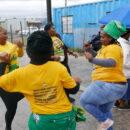Ain Siro: A Taste of Normality
It is a rule of thumb among experienced relief workers that when a community builds and operates a school, it is a sign of normality returning, an indicator of confidence in the future. On arriving in the remote village of Ain Siro in northern Darfur, the school is much in evidence. It is clean and well-organized, with 800 boys and girls, funded almost entirely by voluntary contributions from the community, and it is the pride of Ain Siro. The picture below is the assembly at the start of the school day.
 A few days in Ain Siro is a reminder of what life used to be like in Darfur. The village is nestled in the spine of hills that runs due north from Jebel Marra into the desert. Protected by the mountains, the SLA has controlled the area for the last four years, and for many of the people in the vicinity, allowed an element of normality to return. Villages have been rebuilt, a rudimentary health service set up–and the school re-opened.
A few days in Ain Siro is a reminder of what life used to be like in Darfur. The village is nestled in the spine of hills that runs due north from Jebel Marra into the desert. Protected by the mountains, the SLA has controlled the area for the last four years, and for many of the people in the vicinity, allowed an element of normality to return. Villages have been rebuilt, a rudimentary health service set up–and the school re-opened.
The clinic is run by a former prisoner of war, an Arab medical assistant with the Sudanese army who was captured when he stayed with the wounded soldiers rather than run away. He decided not to stay in Ain Siro and has since married a local woman. The clinic has only modest supplies–far too few for the 80,000 people it serves–and he says he sees malnourished children quite regularly.
The medical assistant is one of the few Arabs in Ain Siro. But the turmoil of war has brought others to the village. There are several southern Sudanese, including some soldiers sent by the SPLA to join the SLA, and others who were IDPs in Darfur and joined the rebellion. There is a Hadendowa from eastern Sudan.
Our stay coincided with a wedding. Many Fur traditions were in evidence, including distinctive music and dancing, and the camel-back chase to catch the bridegroom’s sister from a nearby hilltop.

The local Arabs (Awlad Rashid and Mahariya) are notable by their absence from Ain Siro. But relations with them are slowly improving. Although Abdel Wahid al Nur has refused to join the official peace process, he has instructed SLA commanders to make agreements with the Arab tribes in their vicinity. In many cases, they were already doing this on an ad hoc basis. In the case of Ain Siro, this began when the Arabs stole some livestock and the SLA took an Arab boy prisoner. A meeting was arranged at a neutral place where an exchange took place. Now there are regular meetings (one is pictured below), but the bitter legacy of the recent past runs deep, and so far the Ain Siro community has not agreed that they should permit the Arabs to come to their village. This has proceeded without any external recognition, let alone assistance. Progress has taken years, but it is real. The Arabs say they hope to come to pray in the mosque soon.

Ain Siro shows how people on all sides are tired of war and, when given the chance, can make their own small but significant steps towards peace and normality. When Julie Flint first wrote about Ain Siro “saving itself” in 2007, most were sceptical that it represented anything significant. Two years on, not only has Ain Siro survived, but its model of self-help is less exceptional than it was.







Dear Alex,
it is wonderful to read about this and gives us hope that the ordinary citizens of our country can overcome their hardships and the failures of our political leaders. You come often to Sudan and we know that you are engaged in many practical activities which you do not advertise. For myself I would like to learn more about your activities.
yours sincerely
Jibreel
p.s. I guess that the lady in the photograph is Julie Flint. For her articles over the years beginning in 2002 she deserves our medal for the bravest and morally courageous, that is, honest, journalist who has written on Darfur. I personally nominate her here and now.
Dear Jibreel
Allow me to second your nomination. Only those with true courage can withstand the bombast of the Save Darfur lobby in America which substitutes moralistic simplicities for an honest bravery of reporting the facts. Ms. Flint’s article on the unacknowledged suffering of the Darfuri Arabs is a landmark in journalistic coverage of Darfur. Her chapter on the armed movements in “War in Darfur and the Search for a Peace” is also the best analytical history of the Darfur resistance and its failure to fulfill its historic mission.
The intellectual struggle for liberation remains in a simplistic “for us or against us” phase. Until we are able to transcend this and recognize the illusory promises of liberation or salvation held out by those who are incapable of representing the real interests of the masses, we are doomed to a cycle of unfulfilled promises.
Abd al-Wahab
Dear Jibreel,
You will be familiar with the Sudanese and Islamic tradition of providing assistance discreetly, whereby the left hand should not know the actions of the right. I also believe that the most effective form of political activism is solidarity with the people, in a way so that whatever successes they achieve, they will be able to say, ‘we did this ourselves.’
Alex
Julie Flint, my most favourite reporter on Darfur, puts her whole mind, heart and soul into each one of her reports, deserves a medal for her great compassion and truly courageous reporting on the Sudan crisis.
Dear Alex de Waal
One more wonderful article about the realities of the Sudanese social life during very hard times in a troubled area. I have a deep sense that those who catch the fire of the Darfuri conflict deserve the attention of the the world when it comes to solution finding process. Those who are living far overseas have not tasted the bitterness of thier people suffering and hence they are not in hurry about achieving peace. On the contrary, for some of them the continuation of the war is in thier favour, since it has become a way of living and a source of income. Ironically, the world still dealing with them as the sole representatives of the people of Darfur while they have nothing to do with Darfur just slogans and issues kidnaping. Once again the world credibilty about Darfur is at stake if it chooses to deal with the wrong people to eliminate the plight of the innocent Darfurins.
thank you for the article it fills me with hope for a brighter future for Darfur when I hear that ordinary citizens of Darfur who have been caught up in this conflict are leading the charge for peace.
I am sure that they are gratefull as we all should be that there are credible writers such as Alex de waal and julie flint who are willing to go to unparalleled length tell their story for them.